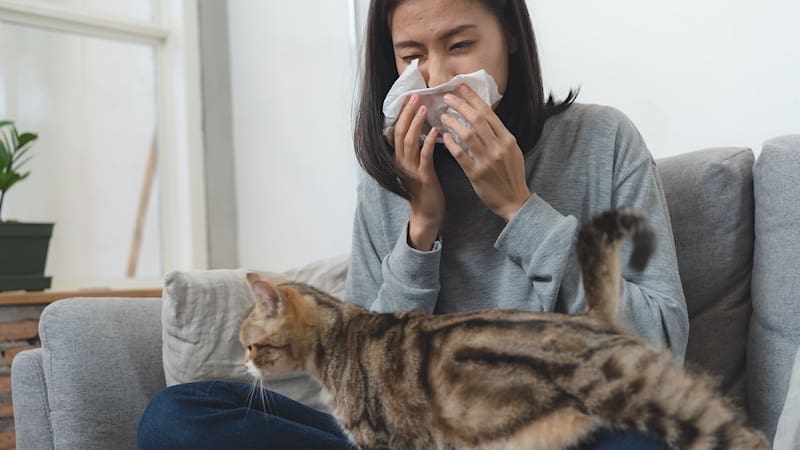Do you suffer from allergies caused by cats? Do not despair, there is hope. You can get rid of cat allergies naturally without the use of harsh medications. An Allergy to cats is very common and affects millions of people every year, but with the right information and remedies it doesn’t have to be a life-long problem.
In this article we will explore what cat allergens are, how to identify your allergy symptoms, natural ways for treating them and preventing future reactions when around cats. Get ready to learn how to get rid of cat allergies naturally so that you can live an allergy free life with your indoor cat.
Identifying You Have an Allergy to Cats

Pet allergies are a common problem for many people. Symptoms can range from mild to severe and include sneezing, coughing, itchy eyes, runny nose, watery eyes, skin rashes or hives. In some cases, the symptoms may be more serious and lead to difficulty breathing or anaphylaxis.
Allergic Symptoms
The most common allergic reaction to a cat is sneezing. Other symptoms may include itchy eyes, coughing, wheezing or shortness of breath. Cat owners with allergies may also experience redness and swelling around their eyes as well as skin rashes or hives. Some people may even develop asthma-like symptoms such as chest tightness and difficulty breathing when exposed to cats.
Common Causes of a Cat Allergy
The most common cause of a cat allergy is dander (dead skin cells) which is shed by cats on a regular basis. Saliva from cats can also trigger allergic reactions in some people due to proteins found in the saliva that act as allergens when inhaled or come into contact with the skin.
A cat’s fur itself does not usually cause an allergic reaction but can carry dander and cat saliva which can trigger an allergic response in sensitive individuals.
Diagnosing a Cat Allergy
It is important to identify the source of your cat allergy so that you can take steps to reduce your symptoms and find relief. Natural remedies, such as dietary changes, herbal treatments, and homeopathic treatments can help reduce the severity of your allergic reactions and make it easier for you to enjoy life with a pet in the home.
Recap: Diagnosing a cat allergy can be tricky as the most common cause is dander, saliva and fur which all have proteins that act as allergens when inhaled or come into contact with the skin.

Natural Remedies for a Cat Allergy
Dietary Changes to Reduce Symptoms:
Eating a balanced diet can help reduce the severity of a cat allergy. Avoiding foods that are known to trigger a reaction, such as dairy products and eggs, is important for those with a cat allergy.
Additionally, eating more anti-inflammatory foods like fruits and vegetables can also be beneficial in reducing cat allergy symptoms. Finally, avoiding processed foods may also help reduce reactions to cats over time.
Herbal Remedies to Relieve Symptoms:
Herbal remedies have been used for centuries to treat various ailments including allergies. Chamomile tea has been found to be effective in relieving cat allergy symptoms due to its anti-inflammatory properties.
Stinging nettle leaf extract has also been shown to reduce inflammation associated with cat allergies when taken orally or applied topically on the skin. Other herbs such as ginger root and turmeric may also provide relief from allergy symptoms when consumed regularly.
Homeopathy is an alternative medicine system that uses natural substances in small doses to stimulate the body’s healing response and relieve symptoms of illnesses including cat allergies.
Homeopathic treatments typically involve taking small amounts of specific substances over time until sensitivity levels decrease significantly or disappear altogether depending on individual cases. Common homeopathic remedies include Allium cepa (onion), Apis mellifica (honey bee venom) and Natrum muriaticum (sea salt).
From herbal remedies to dietary changes, natural remedies for cat allergies can help reduce symptoms and prevent future reactions. However, it is important to consider other strategies such as avoidance techniques and cleaning tips in order to further protect yourself from allergens.
Preventing Future Reactions to Cats
Cats can be a great source of joy and companionship, but for those with allergies, they can also cause significant discomfort. To prevent future reactions to cats, it is important to understand the causes of cat allergies and take steps to reduce exposure and allergen build-up in the home.
Avoidance Strategies for Reducing Exposure to Cats:
One way to reduce exposure is by keeping cats out of certain rooms or areas of the house. This may mean using baby gates or other barriers that keep cats from entering rooms where people spend a lot of time.
Additionally, air purifiers with a HEPA filter can help remove cat allergens from the air when used in areas where cats are present.

Cleaning Tips for Reducing Allergen Build-up in the Home:
Regular vacuuming is essential for reducing cat dander and allergen build-up on carpets and furniture surfaces. Special cleaning products designed specifically for cat owners are available that contain enzymes which break down the FEL D1 proteins found in cat dander, saliva, and urine – all common sources of allergens in homes with pets.
It’s also important to wash your bedding regularly as well as any items that come into contact with your cat such as blankets or toys and you should definitely take steps to keep your cat off your bed at all times.
For those who suffer from severe allergic reactions despite taking avoidance measures at home, there are vaccines available that can help reduce sensitivity over time by introducing small amounts of an allergen into your system gradually so you become less sensitive.
Additionally, over the counter medications such as antihistamines can provide relief from symptoms associated with allergies such as sneezing or itching eyes when taken before coming into contact with a cat or its dander/saliva/urine etc.
Recap: Allergies to cats can be managed by avoiding contact, using air purifiers and HEPA filters, and cleaning regularly; vaccines and antihistamines may also provide relief.
Conclusion
The best way to get rid of cat allergies is to identify the cause, use natural remedies and take preventative measures. Allergies can be a nuisance but they don’t have to be debilitating. With some research and effort, you can reduce your symptoms or even eliminate them altogether.
Taking the time to understand what causes your reactions will help you make better decisions about how to care for yourself and keep cats in your life without suffering from the cat allergens they leave on your furniture and in your carpet
Are you suffering from cat allergies caused by neighbourhood cats invading your garden and causing a nuisance? Discover how to keep cats out of your yard and which cat deterrents actually work. Don’t suffer any longer – there are solutions to help get rid of the problem!
FAQ
Do Male or Female Cats Produce More Allergens?
Male cats produce more Fel D1 protein than female cats but research has found that neutering and spaying reduces the amount of protein both produce. Getting your cat spayed or neutered will help to control your pet allergies.
Can Cat Allergies be Cured?
Allergies to a cat can be a real issue for many people, ranging from sneezing fits to serious asthma attacks. Recent studies suggest that there may be a way to cure or at least reduce the symptoms.
The answer lies in immunotherapy: treating the patient with gradually increasing doses of the allergen, in this case dander from a cat. When administered correctly, it can desensitize sufferers over time and reduce their reaction to a cat.
Research indicates that up to 80% of those who successfully complete an immunotherapy treatment show a marked reduction in symptoms when exposed to a cat and other allergens. In some cases, the allergy has been eliminated entirely!
Although it will take time and dedication on behalf of the patient, immunotherapy could provide relief for those suffering from allergic symptoms to a cat.





